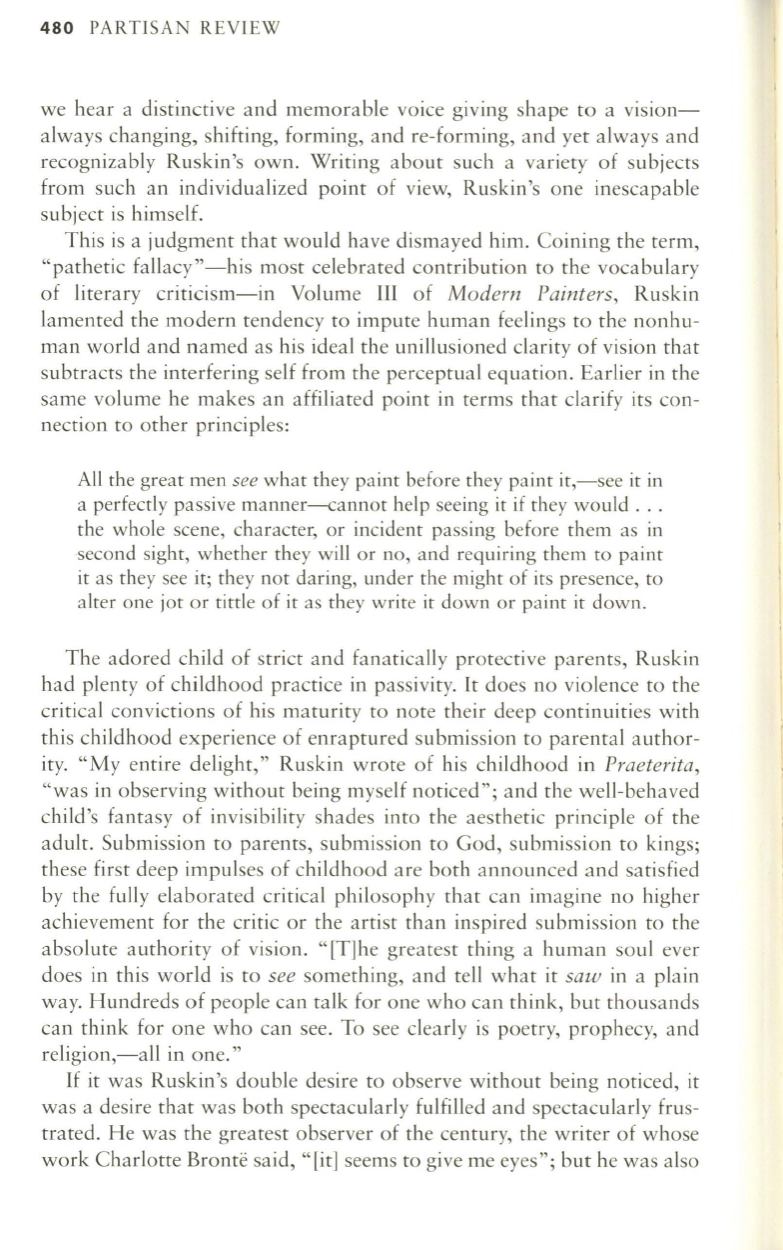
480
PARTISAN REVIEW
we hear a distinctive and memorable voice giving shape
to
a vlsion–
always changing, shifting, forming, and re-forming, and yet always and
recognizably Ruskin's own. Writing about such a variety of subjects
from such an individualized point of view, Ruskin's one inescapable
subject is himself.
This is a judgment that would have dismayed him. Coining the term,
"pathetic fallacy"-his most celebrated contribution
to
the vocabulary
of literary criticism-in Volume III of
Modern Painters,
Ruskin
lamented the modern tendency
to
impute human feelings
to
the nonhu–
man world and named as his ideal the unillusioned clarity of vision that
subtracts the interfering self from the perceptual equation. Earlier in the
same volume he makes an affiliated point in terms that clarify its con–
nection
to
other principles:
All the great men
see
what they paint before they paint it,-see it in
a perfectly passive manner-cannot help seeing it if they would ...
the whole scene, character, or incident passing before them as in
second sight, whether they will or no, and requiring them
to
paint
it as they see it; they not daring, under the might of its presence, to
alter one jot or tittle of it as they write it down or paint it down.
The adored child of strict and fanatically protective parents, Ruskin
had plenty of childhood practice in passivity.
It
does no violence
to
the
critical convictions of his maturity
to
note their deep continuities with
this childhood experience of enraptured submission to parental author–
ity. "My entire delight," Ruskin wrote of his childhood in
Praeterita,
"was in observing without being myself noticed"; and the well-behaved
child's fantasy of invisibility shades into the aesthetic principle of the
adult. Submission
to
parents, submission
to
God, submission to kings;
these first deep impulses of childhood are both announced and satisfied
by the fully elaborated critical philosophy that can imagine no higher
achievement for the critic or the artist than inspired submission to the
absolute authority of vision. "[T]he greatest thing a human soul ever
does in this world is
to
see
something, and tell what it
saw
in a plain
way. Hundreds of people can talk for one who can think, but thousands
can think for one who can see. To see clearly is poetry, prophecy, and
reiigion,-all in one."
If
it was Ruskin's double desire
to
observe without being noticed, it
was a desire that was both spectacularly fulfilled and spectacularly frus–
trated. He was the greatest observer of the century, the writer of whose
work Charlotte Bronte said, "[it] seems
to
give me eyes"; but he was also


